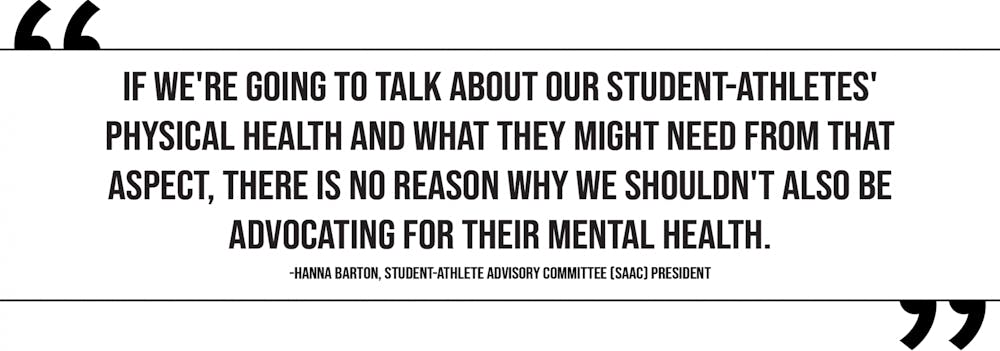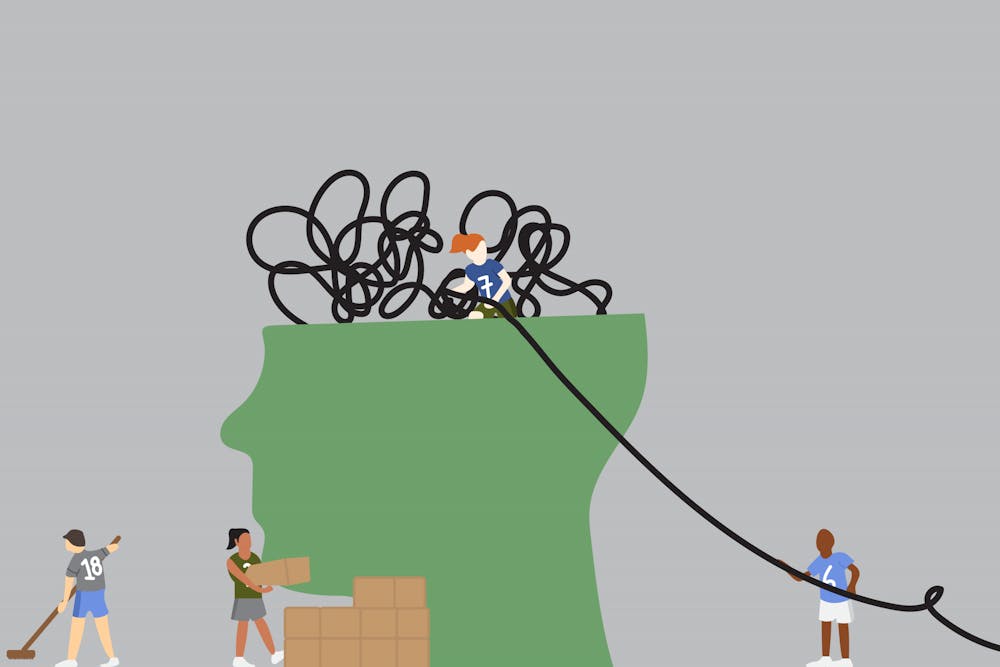The Student-Athlete Advisory Committee (SAAC) is working towards bridging the gap between student-athletes and the athletic administration regarding decisions on mental health resources.
SAAC, a completely student-athlete-run organization, helps athletes communicate with the athletic administration about issues that affect them, as well as promote camaraderie and department-wide community service projects.
"If we're going to talk about our student-athletes' physical health and what they might need from that aspect, there is no reason why we shouldn't also be advocating for their mental health," SAAC President Hanna Barton said. "Let's face it, it's become a huge, huge problem in college athletics."

SAAC meets every two weeks and is made up of at least two representatives from every Gamecocks sports team.
Last summer, Barton and Vice President Claire Pound had the opportunity to attend the Southeastern Conference SAAC meeting at the SEC headquarters. Barton, who also serves as the chair of the mental health subcommittee, said the trip allowed them to recognize that they needed a separate committee to oversee the mental health side of student athletics.
"This is something that I have been passionate about for a very long time," Barton said. "My freshman year of college, I relied very heavily on the mental resources that were provided here, and it really opened my eyes to just how important they are, not just for student-athletes in general, but college students."
Barton said the main issue facing student-athlete mental health is the disconnect between athletes and the athletic administration. However, increased participation and direct feedback from student-athletes through SAAC helped the athletic administration cater its services more, according to Barton.
Their first major collaboration came during Mental Health Awareness Week in the fall of 2022, when members from SAAC met with the athletics department to create awareness initiatives during the week. Additionally, SAAC held a tabling event with Student Government, where it handed out resources the athletics department provided.
Members of the athletics department are also able to sit in on SAAC meetings, hear what the athletes have to say and provide feedback. Sarah Noll, the director of mental health in the athletics department, and Eva Monsma, a professor of physical education at USC, have been integral in the athletics department's collaboration with the organization and in creating a clear vision of the organization's goals.
"(The mental health committee) is a really great addition, too, and we're going to be utilizing them more to help us," Noll said. "Again, not just in letting people know what's available, but also getting input into seeing what sort of resources they would like to see and would like to have."
SAAC is leading the way for athletes to have a say in what resources and decisions are being made about their mental health. Barton said the SAAC's mission of being for athletes, by athletes is "invaluable."
"The reality of it is collegiate athletics is a business," Barton said. "However, you have to always get input from the people that are being used to bring in your revenue, which is athletes. And so, I think being able to just have a voice and have a seat at the table can be extremely beneficial."
Moving forward, the committee is looking to build upon its early stages and continue to educate athletes on what resources are available to them from the athletics administration. Barton said their upcoming project includes social media takeover that allows each Gamecock team to discuss a specific mental health topic each week.
"Their initiative that they're about to roll out is going to be far-reaching," Monsma said. "There is between 540 and 550 athletes, and their coaches and their operations team, etc., that could all potentially get this information through social media."
Monsma, also a faculty athletics representative, said the main goal of the mental health subcommittee has been to enhance mental health literacy. She said it is a foundational skill that all athletes are capable of using and hopes SAAC will promote practicing these skills in order to increase mental health literacy within the athletics community.
"These psychological skills for their performance are like any other skill: They improve with practice," Monsma said. "The more you learn about them, the more you integrate them, the more you become an artist in how you apply it to your own life and maybe even share it with others."

